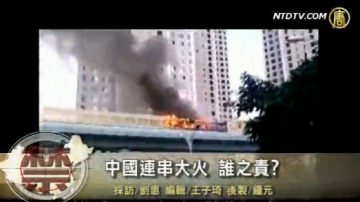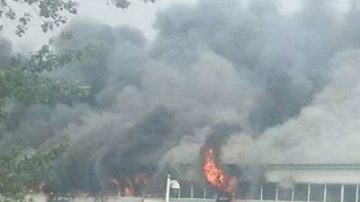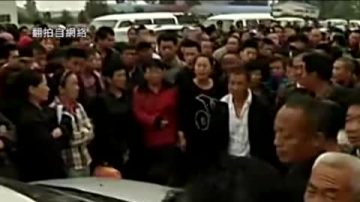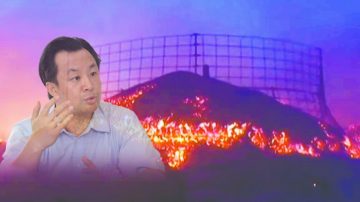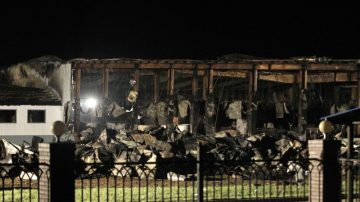【新唐人2013年06月05日讯】中共国家安全监管总局副局长杨元元,在5月31号召开的“全国安全生产月”活动动员视讯会上,强调安全生产的重要性。不过在同一时间,中国却发生四起大火和爆炸事故。纵观这一起又一起的安全事故,大家都在关注是甚么原因造成﹖相关人员有没有善尽管理的责任﹖是否总结过教训﹖而事故的背后是否隐藏领导渎职和腐败问题?接下来,请跟本台记者一起来探讨﹕
“中储粮”黑龙江林甸直属粮库,5月31号发生严重火灾﹔6月2号,中石油大连石化分公司油渣罐爆炸,造成2人失踪,2人死亡,而同一天晚间,湖南邵东县周官桥乡煤矿,又发生瓦斯爆炸,导致10人死亡、15人受伤。
另外,吉林省德惠市家禽屠宰场6月3号发生的火灾事故,目前已知至少造成120人死亡。
而中共领导人习近平、李克强依照惯例作出批示,所谓“要查明事故原因,依法追究责任”﹔还要“深刻总结教训,采取有效措施,防止所谓重特大事故发生。”
深圳独立作家朱健国:“现在出了这么大的事故,他们总是来个重要批示,丝毫不提到自己的责任,几个单位来看,都是违反了国家早已总结的教训,都是多次的三申五令强调要改变的东西,但是实际上底下没有改变,为甚么没有改变,因为各级都是谎言对上,各级都是禁止民主监督。”
中国媒体报导说,今年6月是中国第12个安全生产月,却事故频发,凸显安全生产形势的严峻。
对于一连串事故发生的原因,中共当局的说辞却很一致﹕都属“意外”,粮仓失火是配电箱短路、油罐爆炸是残留的柴油引发、屠宰场爆炸是液氨泄漏造成。
原中国维权律师唐吉田:“像这种事情,要想真正的得出令人信服的结论,在目前情况下,可能是一个比较难办的事,结论本身难以取信于人,那后面追究责任可能就更无从谈起。”
北京网友李学会:“我们每天都坐在火山口上,不知道甚么时候爆发。归根就底就是我们的体制,没有一个官员会拿老百姓身家性命当回事,有个公务员曾经说过,我为人民服务,人民并没有给我权力,只有我的长官给我权力,我就对他负责任。”
这位网友曾经担任安全部门的管理员,他说每当发生事故时,就是欺上瞒下,最后承担事故后果的人,往往都是最基层的替罪羊。
深圳独立作家朱健国:“他(习、李)没有抓住这个根本,他没有在全国开展行政透明,发动鼓励老百姓去据报、去监督,而只是把重心放在摆不摆鲜花,开会住甚么宾馆,这些表面的鸡毛蒜皮的事情上,没有抓住要害,只搞形式主义,本末倒置、避重就轻。”
美国《纽约客》杂志网站,6月3号刊登的一篇博文说,吉林德惠市这家禽肉加工厂的厂房建成只有四年,却存在如此大的安全隐患,这只能说明中国的问题不是贫穷而是法律的混乱。文章说,在今日的中国,人们很少将一起火灾事故仅仅看成是一场火灾,人们会问火灾事故背后的腐败等问题。
而根据逃离火灾的生还者描述,由于厂区内部构造复杂,出口狭小,且前门上锁,让逃生难上加难。
据了解,中国工厂的逃生门经常上锁,或是被物品挡住,厂方大多贿赂官员以规避检查。
采访/朱智善 编辑/黄亿美 后制/郭敬
4 Fire Accidents Start Off China's Production Safety Month
On May 31, Yang Yuanyuan, Chinese Communist Party (CCP)
deputy director of the State Administration of Work Safety
gave a speech the importance of safety in production, during
a 'National Safety Production Month' campaign video conference.
Yet on the same day, China had four fire accidents and explosions.
People are concerned about the causes of
these continuous safety accidents.
Do the related personnel fulfill their responsibilities?
Have they learned any lessons?
Are there hidden issues of misconduct and corruption
behind these incidents? Let's have a look with our reporter.
On May 31 the China Grain Reserves Corporation's
immediate granary in Lindian County of Heilongjiang Province had a serious fire accident.
On June 2, a diesel tank at PetroChina's Dalian Petrochemical
Company exploded, leaving two people missing and two dead.
The same night saw a coal mine gas explosion in
Zhouguanqiao village of Shaodong County, Hunan Province, leaving ten dead and 15 injured.
In addition, Dehui City in Jilin Province also had a fire
accident on June 3, with 120 deaths currently confirmed.
CCP leaders Xi Jinping and Li Keqiang gave instructions to
“investigate the causes of accidents and prosecute those
responsible according to law”; and to “deeply learn a lesson,
and carry out measures effectively to prevent more accidents”.
Shenzhen independent writer, Zhu Jianguo:
“Now whenever such serious accidents occur,
they always give such important instruction,
in which they mention nothing about their responsibilities.
Looking at these companies that had fires, they all
go against the nation's earlier lessons learned;
all have been stressed repeatedly to change,
but actually the lower levels did not change, why not,
because all levels tell lies to upper levels,
and all levels forbid democratic supervision.”
Chinese media report that while June is
China's 12th annual Production Safety Month,
continuous accidents highlight the seriousness of
the situation of production safety.
Regarding causes of these continuous accidents,
the rhetoric from CCP authorities is very consistent:
All are considered as 'accidents'.
The granary fire was because of a short in a circuit breaker;
the oil tank explosion was triggered by leftover diesel; and
the slaughterhouse explosion was due to an ammonia leak.
Former Chinese human rights lawyer, Tang Jitian: “With this
kind of thing, if we really want to draw convincing conclusions,
under current circumstances, it might be a difficult task to do.
The conclusion itself cannot be trusted, and
the accountability may even be impossible to chase'.
Beijing netizen Li Xuhui: “We are sitting on a
volcano every day, and don't know when it'll explode.
All in all, it is because of our system,
no officials take people's lives seriously.
Once, a civil servant told me, 'I serve the people,
but the people do not give me the power,
only my leader gives me the power, so I serve him.'“
This netizen once served as administrator of a security sector.
He says when accident occurred, it was to fool
the upper levels and hide it from the people;
in the end, the one who took the responsibilities
was usually the scapegoat at the lowest level.
Shenzhen independent writer, Zhu Jianguo:
“They (Xi and Li) don't hit a root issue:
The need to implement administration transparency in the
country, and encourage the people to report and supervise.
They focus on tangental issues, the surface things.
Instead of seizing the key problems, they engage in formalities,
avoiding the real issues and dwelling on the trivial ones.”
The U.S. 'New Yorker' magazine website,
published a blog article on June 3, saying that
the slaughter house in Dehui City, Jilin Province,
was only built 4 years ago,
yet it still has such serious security risks,
and that this can only show that
China's problems are not only poverty but legal confusion.
The article said that, nowadays in China,
people rarely see fire incidents as an accident,
people will ask about the corruption issues
behind the fire incident.
The survivors who fled from the fire said that
the complex internal structure of the factory,
a small exit, and a locked front door,
all made escaping more difficult than necessary.
It is understood that Chinese factories' escape doors
are always locked, or blocked by objects,
and that most of the factories bribe the officials
to avoid inspections.
“中储粮”黑龙江林甸直属粮库,5月31号发生严重火灾﹔6月2号,中石油大连石化分公司油渣罐爆炸,造成2人失踪,2人死亡,而同一天晚间,湖南邵东县周官桥乡煤矿,又发生瓦斯爆炸,导致10人死亡、15人受伤。
另外,吉林省德惠市家禽屠宰场6月3号发生的火灾事故,目前已知至少造成120人死亡。
而中共领导人习近平、李克强依照惯例作出批示,所谓“要查明事故原因,依法追究责任”﹔还要“深刻总结教训,采取有效措施,防止所谓重特大事故发生。”
深圳独立作家朱健国:“现在出了这么大的事故,他们总是来个重要批示,丝毫不提到自己的责任,几个单位来看,都是违反了国家早已总结的教训,都是多次的三申五令强调要改变的东西,但是实际上底下没有改变,为甚么没有改变,因为各级都是谎言对上,各级都是禁止民主监督。”
中国媒体报导说,今年6月是中国第12个安全生产月,却事故频发,凸显安全生产形势的严峻。
对于一连串事故发生的原因,中共当局的说辞却很一致﹕都属“意外”,粮仓失火是配电箱短路、油罐爆炸是残留的柴油引发、屠宰场爆炸是液氨泄漏造成。
原中国维权律师唐吉田:“像这种事情,要想真正的得出令人信服的结论,在目前情况下,可能是一个比较难办的事,结论本身难以取信于人,那后面追究责任可能就更无从谈起。”
北京网友李学会:“我们每天都坐在火山口上,不知道甚么时候爆发。归根就底就是我们的体制,没有一个官员会拿老百姓身家性命当回事,有个公务员曾经说过,我为人民服务,人民并没有给我权力,只有我的长官给我权力,我就对他负责任。”
这位网友曾经担任安全部门的管理员,他说每当发生事故时,就是欺上瞒下,最后承担事故后果的人,往往都是最基层的替罪羊。
深圳独立作家朱健国:“他(习、李)没有抓住这个根本,他没有在全国开展行政透明,发动鼓励老百姓去据报、去监督,而只是把重心放在摆不摆鲜花,开会住甚么宾馆,这些表面的鸡毛蒜皮的事情上,没有抓住要害,只搞形式主义,本末倒置、避重就轻。”
美国《纽约客》杂志网站,6月3号刊登的一篇博文说,吉林德惠市这家禽肉加工厂的厂房建成只有四年,却存在如此大的安全隐患,这只能说明中国的问题不是贫穷而是法律的混乱。文章说,在今日的中国,人们很少将一起火灾事故仅仅看成是一场火灾,人们会问火灾事故背后的腐败等问题。
而根据逃离火灾的生还者描述,由于厂区内部构造复杂,出口狭小,且前门上锁,让逃生难上加难。
据了解,中国工厂的逃生门经常上锁,或是被物品挡住,厂方大多贿赂官员以规避检查。
采访/朱智善 编辑/黄亿美 后制/郭敬
4 Fire Accidents Start Off China's Production Safety Month
On May 31, Yang Yuanyuan, Chinese Communist Party (CCP)
deputy director of the State Administration of Work Safety
gave a speech the importance of safety in production, during
a 'National Safety Production Month' campaign video conference.
Yet on the same day, China had four fire accidents and explosions.
People are concerned about the causes of
these continuous safety accidents.
Do the related personnel fulfill their responsibilities?
Have they learned any lessons?
Are there hidden issues of misconduct and corruption
behind these incidents? Let's have a look with our reporter.
On May 31 the China Grain Reserves Corporation's
immediate granary in Lindian County of Heilongjiang Province had a serious fire accident.
On June 2, a diesel tank at PetroChina's Dalian Petrochemical
Company exploded, leaving two people missing and two dead.
The same night saw a coal mine gas explosion in
Zhouguanqiao village of Shaodong County, Hunan Province, leaving ten dead and 15 injured.
In addition, Dehui City in Jilin Province also had a fire
accident on June 3, with 120 deaths currently confirmed.
CCP leaders Xi Jinping and Li Keqiang gave instructions to
“investigate the causes of accidents and prosecute those
responsible according to law”; and to “deeply learn a lesson,
and carry out measures effectively to prevent more accidents”.
Shenzhen independent writer, Zhu Jianguo:
“Now whenever such serious accidents occur,
they always give such important instruction,
in which they mention nothing about their responsibilities.
Looking at these companies that had fires, they all
go against the nation's earlier lessons learned;
all have been stressed repeatedly to change,
but actually the lower levels did not change, why not,
because all levels tell lies to upper levels,
and all levels forbid democratic supervision.”
Chinese media report that while June is
China's 12th annual Production Safety Month,
continuous accidents highlight the seriousness of
the situation of production safety.
Regarding causes of these continuous accidents,
the rhetoric from CCP authorities is very consistent:
All are considered as 'accidents'.
The granary fire was because of a short in a circuit breaker;
the oil tank explosion was triggered by leftover diesel; and
the slaughterhouse explosion was due to an ammonia leak.
Former Chinese human rights lawyer, Tang Jitian: “With this
kind of thing, if we really want to draw convincing conclusions,
under current circumstances, it might be a difficult task to do.
The conclusion itself cannot be trusted, and
the accountability may even be impossible to chase'.
Beijing netizen Li Xuhui: “We are sitting on a
volcano every day, and don't know when it'll explode.
All in all, it is because of our system,
no officials take people's lives seriously.
Once, a civil servant told me, 'I serve the people,
but the people do not give me the power,
only my leader gives me the power, so I serve him.'“
This netizen once served as administrator of a security sector.
He says when accident occurred, it was to fool
the upper levels and hide it from the people;
in the end, the one who took the responsibilities
was usually the scapegoat at the lowest level.
Shenzhen independent writer, Zhu Jianguo:
“They (Xi and Li) don't hit a root issue:
The need to implement administration transparency in the
country, and encourage the people to report and supervise.
They focus on tangental issues, the surface things.
Instead of seizing the key problems, they engage in formalities,
avoiding the real issues and dwelling on the trivial ones.”
The U.S. 'New Yorker' magazine website,
published a blog article on June 3, saying that
the slaughter house in Dehui City, Jilin Province,
was only built 4 years ago,
yet it still has such serious security risks,
and that this can only show that
China's problems are not only poverty but legal confusion.
The article said that, nowadays in China,
people rarely see fire incidents as an accident,
people will ask about the corruption issues
behind the fire incident.
The survivors who fled from the fire said that
the complex internal structure of the factory,
a small exit, and a locked front door,
all made escaping more difficult than necessary.
It is understood that Chinese factories' escape doors
are always locked, or blocked by objects,
and that most of the factories bribe the officials
to avoid inspections.


